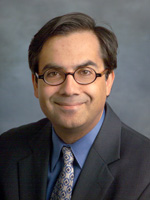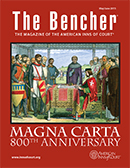Special Conflicts of Interest for Former and Current Government Officers and Employees
The Bencher—May/June 2015
By John P. Ratnaswamy, Esquire

 Because this issue of The Bencher relates to Magna Carta, I looked for an ethics issue relating to the government. There is recent discussion on law practice blogs about what it might mean, if anything, when the Solicitor General of the United States files a brief on behalf of a federal department or agency other than the Department of Justice, but that other entity does not itself sign the brief. That topic did not appear to me, however, to be primarily a legal ethics topic. I decided to focus on certain conflict of interest principles relating to lawyers who are former or current government officers and employees.
Because this issue of The Bencher relates to Magna Carta, I looked for an ethics issue relating to the government. There is recent discussion on law practice blogs about what it might mean, if anything, when the Solicitor General of the United States files a brief on behalf of a federal department or agency other than the Department of Justice, but that other entity does not itself sign the brief. That topic did not appear to me, however, to be primarily a legal ethics topic. I decided to focus on certain conflict of interest principles relating to lawyers who are former or current government officers and employees.
American Bar Association Model Rule of Professional Conduct 1.11 is entitled: "Special Conflicts of Interest for Former & Current Government Officers & Employees". Note that the rule is not limited to service as a government attorney. The rule refers to a government "employee" or "public officer". Subsections (a), (b), and (c) relate to lawyers in private practice, although this can include lawyers who have a government position and a private practice role at the same time. Subsection (d) relates to lawyers currently in a government position. (Subsection (e) defines the term "matter" for purposes of the rule.) The rule is lengthy, so the following is just a high level summary.
Subsection (a) incorporates the general rule regarding duties to former clients (1.9). Subsection (b) contains a provision imputing disqualification under subsection (a), subject to timely screening of the lawyer in question with prompt written notice to the agency to enable it to ascertain compliance. Subsection (c) addresses representing a private client whose interests are adverse to a person about whom the lawyer knows confidential government information that could be used to the material disadvantage of that person. This provision includes an exception for timely screening coupled with no fee apportionment.
Subsection (d) incorporates the general rule on conflicts of interest (1.7) and Rule 1.9. The subsection also limits participation in matters in which the lawyer participated personally and substantially while in private practice, subject to the agency's informed consent. The subsection also limits negotiating for private employment in some circumstances.
Rule 1.11 is a model rule, but issues under governing versions of the rule come up every day. A lawyer moving to or from government service is a routine occurrence, of course, and a lawyer having government and private practice roles at the same time is common. The ubiquity of such situations is reflected in the many cases and other authorities regarding Rule 1.11 in the ABA's Annotated Model Rules of Professional Conduct, pp. 190-199 (7th ed. 2011).
Some recent examples illustrate some of the varied situations in which "Rule 1.11 issues" arise. New York State Bar Association, Committee on Professional, Ethics Opinion 1029, issued Oct. 23, 2014, addresses issues relating to an agency lawyer who previously represented a non-governmental client in litigation against the agency. Opinion 2014-2 of the Board of Commissioners on Grievances & Discipline of the Supreme Court of Ohio, issued August 8, 2014, addressed conflicts, imputation, and screening issues arising out of a part-time county prosecutor's practice in a law firm. State of Nevada v. Eighth Judicial District Court, et al., No. 62615 (Nev. March 27, 2014), addressed whether a district attorney's conflict of interest arising out of private practice is imputed to other lawyers in the prosecutor's office.
A lawyer dealing with an ethics issues arising out of current or former government service may need to consider whether not only general ethics rules but also "Rule 1.11" type provisions speak to their conduct.
John P. Ratnaswamy, Esquire is a partner in the Chicago law firm of Rooney Rippie & Ratnaswamy LLP. He also serves as an Adjunct Professor of Legal Ethics at the Northwestern University School of Law. He is a former member of the American Bar Association's Standing Committee on Ethics and Professional Responsibility, and is cochair of the ABA Solo, Small Firm and General Practice Division's Committee on Ethics and Professional Responsibility. He is also a member of the Hearing Board of the Illinois Attorney Registration & Disciplinary Commission. This column should not be understood to represent the views of any of those entities or his or the firm's current or former clients.
© 2015 JOHN P. RATNASWAMY, ESQ. This article was originally published in the May/June 2015 issue of The Bencher, the flagship magazine of the American Inns of Court. This article, in full or in part, may not be copied, reprinted, distributed, or stored electronically in any form without the express written consent of the American Inns of Court.